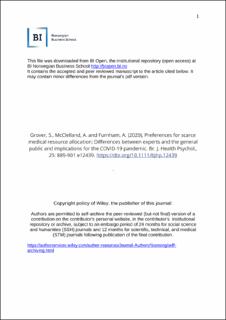| dc.contributor.author | Grover, Simmy | |
| dc.contributor.author | McClelland, Alastair | |
| dc.contributor.author | Furnham, Adrian | |
| dc.date.accessioned | 2021-09-29T11:26:35Z | |
| dc.date.available | 2021-09-29T11:26:35Z | |
| dc.date.created | 2020-07-14T15:07:08Z | |
| dc.date.issued | 2020 | |
| dc.identifier.citation | British Journal of Health Psychology. 2020, 25: 889-901, e12439 | en_US |
| dc.identifier.issn | 1359-107X | |
| dc.identifier.uri | https://hdl.handle.net/11250/2786007 | |
| dc.description.abstract | This study concerns what lay people believe is the best way to allocate scarce medical resources. A sample of 515 individuals completed a short questionnaire asking them to rank‐order eight different ethical positions with respect to the allocation of scarce resources. They showed a strong preference for the ‘saves most lives’ and ‘sickest first’ options, with ‘reciprocity’ and a ‘lottery’ being least favoured. There was a reasonable degree of unanimity amongst respondents and comparatively few correlations with individual difference factors such as demography. The preference results are compared to expert recommendations (Emanuel et al ., 2020, N. Engl. J. Med ., 382 , 2049) made in light of the current coronavirus pandemic, and differences are highlighted. Implications for scare medical resource allocations are discussed, and limitations of the study acknowledged. | en_US |
| dc.language.iso | eng | en_US |
| dc.publisher | Wiley | en_US |
| dc.title | Preferences for scarce medical resource allocation: Differences between experts and the general public and implications for the COVID‐19 pandemic | en_US |
| dc.type | Journal article | en_US |
| dc.type | Peer reviewed | en_US |
| dc.description.version | acceptedVersion | en_US |
| dc.source.pagenumber | 13 | en_US |
| dc.source.journal | British Journal of Health Psychology | en_US |
| dc.identifier.doi | 10.1111/bjhp.12439 | |
| dc.identifier.cristin | 1819415 | |
| dc.source.articlenumber | e12439 | en_US |
| cristin.ispublished | true | |
| cristin.fulltext | postprint | |
| cristin.qualitycode | 1 | |
